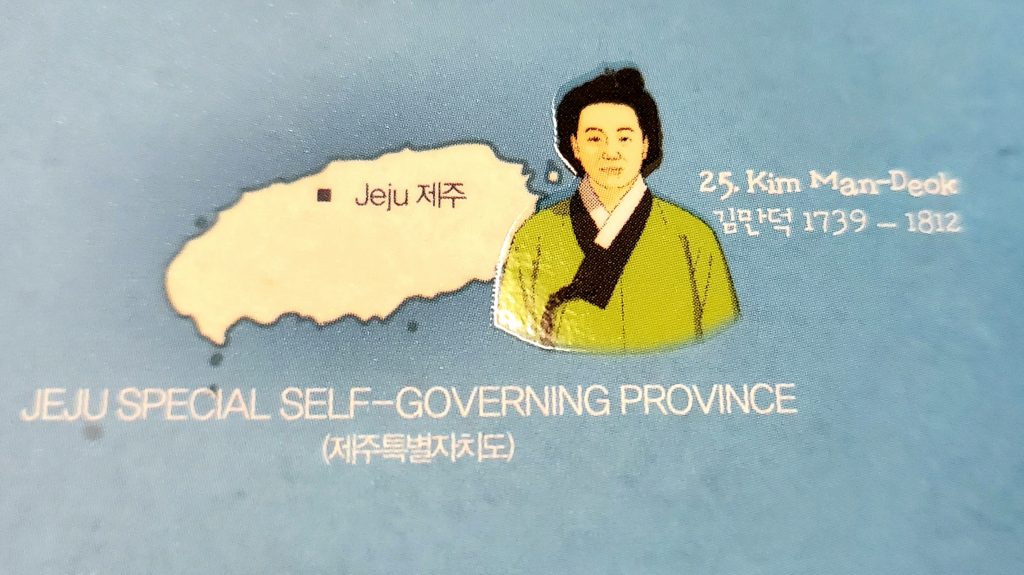
Illustration of Kim Man-deok and Jeju Island
During the 18th century in Joseon, women’s role was limited. How would people that time see a businesswoman? Unlike the present day, it was unheard of for a woman to have a successful career. However, there was a prominent figure who advocated for feminism during that period. That is Kim Man-deok, from Jeju Island who displayed a liberal example and became a philanthropic spirit and a symbol of generosity and public service in Joseon.
Kim Man-deok (1739 – 1812) was originally born into a modest family on Jeju Island. Her father was a merchant who traveled between Naju, a city in South Jeolla Province, and Jeju to sell Jeju’s regional specialties such as seaweed, tangerines, abalone and more. However, while coming back to Jeju, Kim Man-deok’s father’s boat was hit with a storm resulting in his death and after that incident Man-deok’s mother passed away the next year due to shock and a contagious disease that resulted in 882 deaths in Jeju. Thus Man-deok became an orphan at a young age and was separated from her brothers. Her brothers were adopted by relatives but in Man-deok’s case she was raised as a foster daughter by an ex-gisaeng, Toegi. As time went on, Man-deok learned the music and dance of a gisaeng and had also discovered her instrumental talent. Eventually she became a well-known entertainer not only in Jeju but also on the mainland of Joseon. With her extraordinary talent she was able to escape from poverty and save up some wealth. But there was another problem that Man-deok could not get off her mind. That was, it was impossible for a female gisaeng to live as a middle-class woman. As her name was listed on a law book of names of slaves and servants that included female gisaengs. Since her status was the same as a servant, in her early 20s Man-deok decided to go to the government office and file an appeal to reclaim her status.
After Man-deok reclaimed her social status, she started a Gaekju business at Gunnip Port which can be seen as a hospitality business as well as a middleman for companies. As a woman, there were many challenges that needed to be overcome, however Man-deok demonstrated her outstanding talent in business and trade resulting in her becoming one of the most successful female merchants in Joseon.
1792 was the start of a long 4-year famine that struck Jeju Island causing about one third of Jeju’s citizens to die from starvation. Struck with sympathy for the people of Jeju and her philanthropic spirit and efforts, Man-deok generously donated her entire fortune to support the people. Due to her kindness and selflessness, the governor of Jeju at that time was impressed and reported her outstanding kindness to the Royal Court. As a woman who does not have a royal or noble status, she was the first ever woman to be granted an audience with the King with her social status. She was also bestowed with an honorary title and position of female physician of the palace dispensary as a reward for her benevolent deed.
Kim Man-deok was not only an outstanding businesswoman but also a selfless philanthropist. With her generosity and goodwill of thinking for the citizens of Jeju, she is still remembered as a heroic figure till this day.
Written by: Sara Nishiie
From Hawaii, United States. Senior attending University of Hawai’i at Mānoa. Candidate in Korean Language For Professionals (Korean Flagship) and Travel Industry Management. Exchange student at Korea University. Intern at VANK (Voluntary Agency Network of Korea)